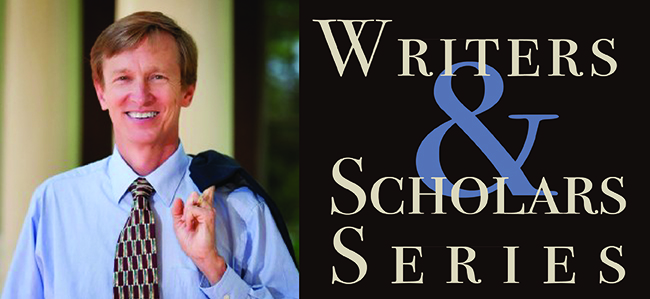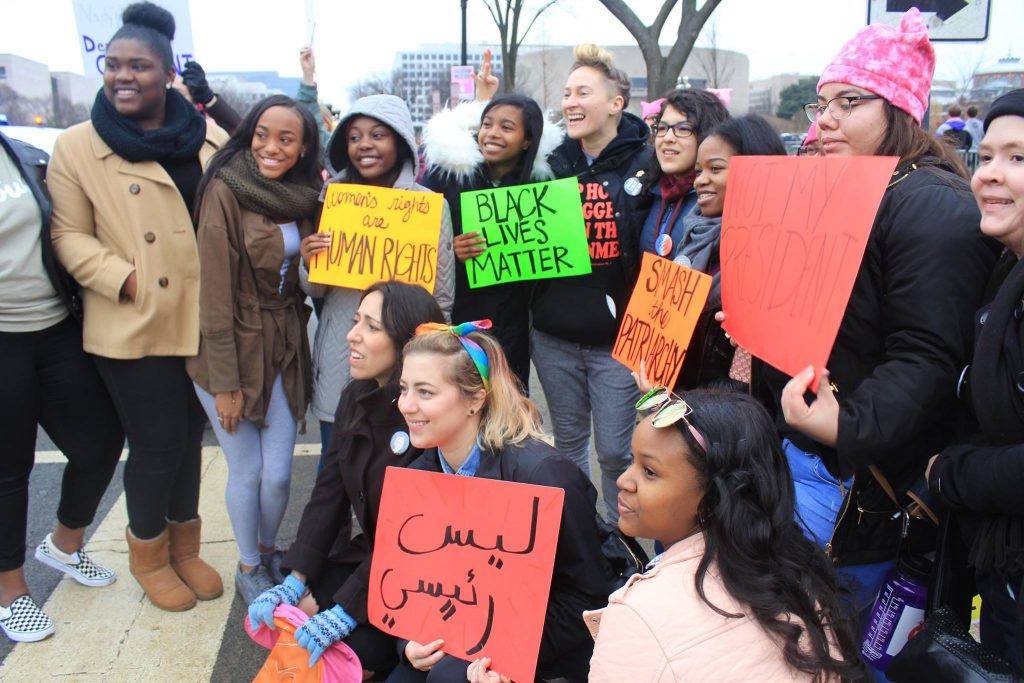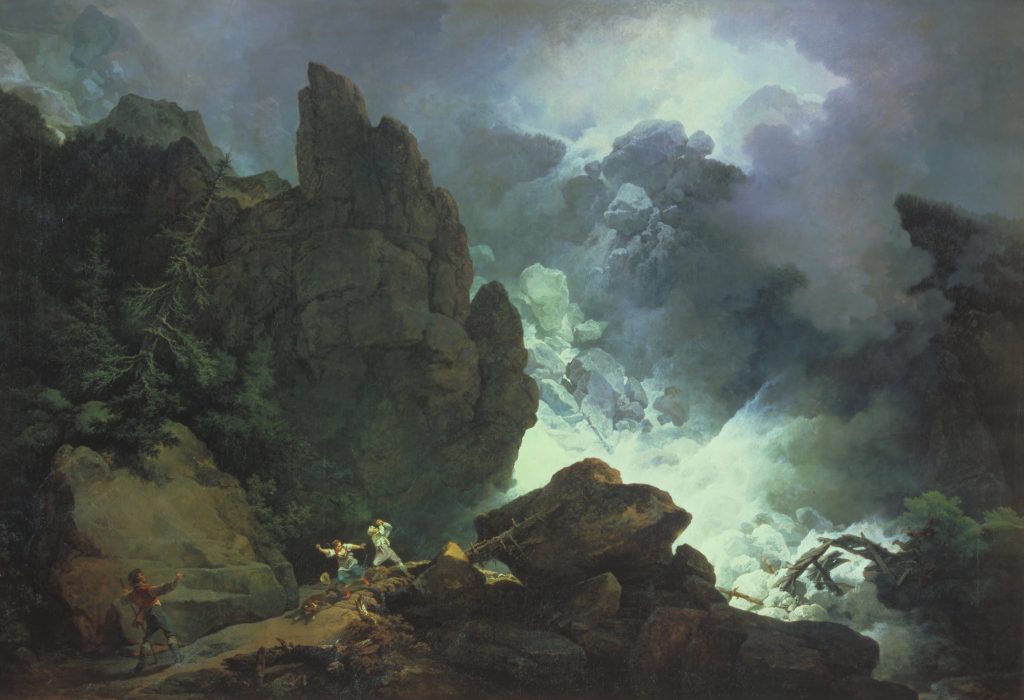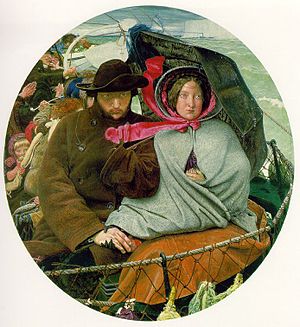[Excerpts from my 15 February 2017 Writers & Scholars Talk “She Persisted: Mathilde Blind in Her Time and Ours” at Agnes Scott College. Photos of Agnes Scott College students at the Women’s March courtesy of Maya McKenzie (’07) and Agnes Scott College and used by permission.]
I want to dedicate my remarks tonight to the students of Agnes Scott College–queer, straight, transgender–who I trust will find in Mathilde Blind a companionable spirit who still speaks to them 120 years after her death–just as she spoke to and for other creative spirits and independent thinkers (like her friends Vernon Lee and Oscar Wilde). As my students from last semester’s Victorian Sexualities class know, Blind was a sexual noncomformist, and like other late-century writers she openly challenged gender and sexual binaries. And while you can read all about this aspect of her life and career in my book, Mathilde Blind: Late-Victorian Culture and the Woman of Letters, published in January by the University of Virginia Press, tonight I want to focus on recent American political developments, and explore a few of the ways in which Blind’s experiences in late-Victorian London speak to them.
So: to begin. Agnes Scott College President Elizabeth Kiss has called our students “feisty”; I want to talk about a woman whose life and career suggests a more appropriate adjective: fierce. To use the contemporary American vernacular, she was one of the “nasty women” of the Victorian era, and she persisted in her pursuit of literature as a form of political intervention (I use “political” here in its broadest sense).
In fact, Mathilde Blind had much in common with the women in these images:
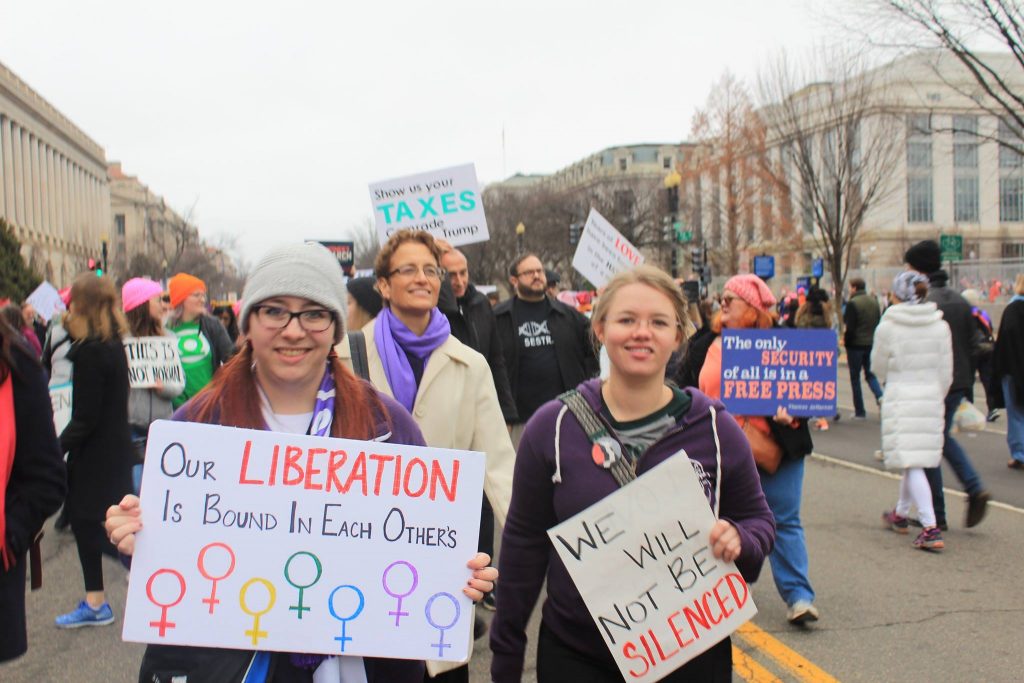 Agnes Scott College students (and college president Elizabeth Kiss) marching in Washington, D.C. on 21 January 2017
Agnes Scott College students (and college president Elizabeth Kiss) marching in Washington, D.C. on 21 January 2017
The 21 January 2017 Women’s March, as you know, was a worldwide protest that advocated for legislation and policies regarding human rights, women’s rights, immigration reform, healthcare reform, reproductive rights, the natural environment, LGBTQ rights, racial equality, freedom of religion, and workers’ rights. Mathilde Blind supported these rights as well, either directly or obliquely, in her writing and her public statements. She also, like some of the Agnes Scott students who marched in late January, wanted to dismantle the patriarchy (or “Smash the Patriarchy,” as one of the signs in the photograph below announces). Her first published essay, appearing in 1870 in the influential Westminster Review, praised the poet Shelley’s poem Prometheus Unbound as an “enfant terrible” of a poem designed to “take by storm” “that triple-headed power which rules the world”: “theology, monarchy, and matrimony.” As a radical freethinker, Republican and feminist, she opposed all three. She also told her friend Richard Garnett that women should be allowed to pursue all professions, including those traditionally reserved only for men, and when Garnett expressed dismay at “throwing a mass of cheap labour into occupations much overstocked,” she replied that “the men might emigrate.” These views meant she was often ostracized and marginalized by many of her contemporaries; but she also discovered and was supported by a remarkable group of fellow freethinkers, rebels against the gender system, and political radicals.
Agnes Scott College students marching in Washington, D.C. on 21 January 2017
How to talk about Mathilde Blind’s relevance to our current political climate in 40 minutes? First, by talking about the philosophical and literary concept of the sublime, and its relevance to political movements; then by talking about Blind’s status as an immigrant, political refugee and cosmopolitan; and finally by noting her intellectual and political affinities with today’s Agnes Scott College women and activists.
The Sublime
“The passion caused by the great and sublime in nature . . . is Astonishment; and astonishment is that state of the soul, in which all its motions are suspended, with some degree of horror. In this case the mind is so entirely filled with its object, that it cannot entertain any other.” –Edmund Burke, On the Sublime
“An Avalanche in the Alps,” by Philip James de Loutherbourg
The experience of the sublime usually occurred to the solitary individual, as it did for the poet William Wordsworth. The following passage from his poem The Prelude is a description of a night-time ascent of Snowdon, a mountain in North Wales that Wordsworth climbed in 1791 when he was 21. Notice that Wordsworth’s language accommodates atheists (like Mathilde Blind) as well as believers:
A meditation rose on me that night
Upon the lonely mountain when the scene
Had passed away, and it appeared to me
The perfect image of a mighty mind,
Of one that feeds upon infinity,
That is exalted by an under-presence,
The sense of God, or whatso’er is dim
Or vast in its own being …
(1805 Prelude, lines 66-73)
The Political Sublime
Later writers like Mathilde Blind extended the concept of the sublime to encompass communal experiences of human solidarity and exaltation, experiences of nearly overwhelming intensity and import. And this phenomenon continues in our day. Consider the ways in which some writers and speakers have described the 21 January 2017 Women’s March. The Politicus podcast reporting on the march is headlined “Women’s March Brings a Pink Apocalypse Upon Drumpf” (the very notion of an apocalypse, which combines feelings of terror with feelings of revelatory change, is a form of the sublime). Note, too, these excerpts from the Politicus website, under the headline “Women’s March Is The Biggest Protest In US History As An Estimated 2.9 Million March,” which emphasize the historical (and numerical) enormity of the event:
1982’s anti-nuclear march in New York City drew an estimated crowd of 1 million. The 1963 Civil Rights March on Washington drew 250,000. 1969 anti-Vietnam war march in Washington was attended by an estimated 500,000-600,000. 1995’s Million Man March was attended by 400,000-1.1 million. In 1993, the LGBT March for equal rights had a crowd of 800,00-1 million.
An estimated 60,000 people marched in Atlanta. 250,000 are marching in Chicago. There are estimates of 250,000 people in Boston, and 200,000 more in Denver. In New York, the estimate ranges from 200,000-500,000. City officials estimate that 500,000 people participated in the main march in Washington, DC. In Los Angeles, the estimate is anywhere from 200,000-750,000.
There has never been anything in US history like the Women’s March. It is nationwide, and proof that the American people are not going accept the agenda of the Drumpf administration without a serious fight.
Mathilde Blind also wrote about her own political involvement in terms that evoke the sublime. I’ll read from a short section of chapter three of my biography to illustrate this:
On the evening of 21 March 1872, snow blanketed the streets of northeast London as Mathilde Blind set out to express her solidarity with fellow republicans, freethinkers, and supporters of women’s rights. She was accompanied by her friend Eliza Orme, secretary of the London National Society for Women’s Suffrage. They joined nearly 2,000 others who gathered in St. James Hall to hear from two leaders of the Republican cause in England. A capacity crowd had gathered to hear from Charles Bradlaugh, the leading freethinker in Britain, and to honor radical MPs Charles Dilke and Auberon Herbert, both of whom argued that the United Kingdom should adopt a republican form of government. Three days earlier Dilke had introduced a motion in the House of Commons calling for an investigation of Queen Victoria’s expenditures as part of an initiative to reform the Civil List. Herbert seconded the motion, and though it failed by a vote of 276 to 2, both men were hailed as heroes by Blind and her fellow radicals for this direct challenge to the power of the monarchy.
Bradlaugh was the featured speaker at this gathering because the event was organized to oppose the Parks Regulation Bill. Bradlaugh led the resistance to this bill, which restricted freedom of assembly and speech in the city’s four major parks–Hyde Park, Regent’s Park, Richmond Park, and St. James’s Park. (Parliament annulled this bill in December 1872, due in large part to Bradlaugh’s agitation). Since the Hyde Park Speaker’s Corner was the most important public forum in London for political discussion and debate, the bill was seen as an attempt to suppress political dissent.
“. . . the reception given to Bradlaugh and Sir Charles Dilke was something overwhelming. A fury of enthusiasm thrilling through two thousand . . . and raging for several minutes like a hurricane lashed and dashed against the speakers who stood perfectly calm and unmoved.” –Mathilde Blind
Blind described the atmosphere at what she called the “Monster Meeting” at St. James Hall in a letter to [Richard] Garnett a day after the event, emphasizing the rapturous reception given to the representatives of radicalism and reform “Mon Dieu what a spectacle it was; the reception given to Bradlaugh and Sir Charles Dilke was something overwhelming. A fury of enthusiasm thrilling through two thousand . . . and raging for several minutes like a hurricane lashed and dashed against the speakers who stood perfectly calm and unmoved. If my words seem extravagant they are but feeble echoes of a tremendous extravaganza.” Blind’s description might seem hyperbolic, but it was echoed in newspaper accounts of the event, including one by the London correspondent for the New York Times, who described the “storm of applause” that greeted Dilke “which culminated after a few minutes in Kentish fire.” As Blind’s letter continues, she turns to nature for metaphors to convey her response to this event:
What a sense of delight there is . . . in these passionate outbursts of great multitudes; something akin to the breadth and magnitude of storms on the ocean. . . . And then one issued out into the calm, frosty, moonlit night. Saw all these houses with the sleepers within and the snow above so quiet, so peaceful. The Church and the Churchyard with the dead so still and the still dark shadows of the trees slanting the shroud of snow and the soul realized for moment the wonderful mysteriousness of this most mysterious world.
In this passage Blind invokes the Romantic sublime–the sense of awe in the presence of something beyond the mind’s capacity to contain–to celebrate the nearly overwhelming sense of collective energy and solidarity among her fellow radicals. She also links herself and her contemporaries to their dead yet still influential ancestors, much as her 1881 sonnet “The Dead” would do. “Our perishable bodies are the mould / in which their strong, imperishable will, / Mortality’s deep yearning to fulfill, / Hath grown incorporate through dim time untold.” . . .
Bradlaugh himself was often described in terms that evoke the sublime. One of the most remarkable radicals to emerge from the working classes in the nineteenth century, the Irish journalist T. P. O’Connor would later compare him to another towering nineteenth-century figure who threatened the bourgeois order—the creature in Mary Shelley’s Frankenstein: “imagine . . . a huge creature, some six feet one or two high; conjure up a vision of a man who looked at once like a coal heaver or a pugilist and a great thinker, and a protagonist in the fight of ideas, and you have some idea of what the figure of Bradlaugh suggested.” For Blind, who told Garnett that her early desire was to become a platform speaker, Bradlaugh exemplified republican ideals of reformist agitation.
(italicized passages excerpted from Mathilde Blind: Late-Victorian Culture and the Woman of Letters, pp. 91-2)
To give just one example of the politically charged nature of the Hyde Park gatherings that Bradlaugh, Blind and others sought to protect: the Times of London, reflecting the unease of the establishment of the day, declared after one Hyde Park demonstration in 1866 that “it is against all reason and all justice that motley crowds from all parts of the metropolis should take possession of Hyde Park, and interfere with the enjoyments of those to whom the Park more particularly belongs.” But reporting on the same event, the radical Reynolds’ Newspaper of 29 July 1866 declared exultantly that despite the attempts of the police and troops to prevent them, “the people have triumphed, in so far as they have vindicated their right to meet, speak, resolve, and exhort in Hyde Park.”
Asylum, Immigration, and Cosmopolitanism
Blind associates herself in her letter to Garnett with fellow British radicals, but she was in fact something of an outsider in Britain at this time–in several senses of the term. She was a German immigrant and political refugee, for one thing, the daughter of a famous mother and stepfather who were friends and colleagues of Karl Marx and participated in the 1848 revolutions that swept through Italy, France and Germany (which is why the family fled the Continent for England in 1850). She was also a woman in open revolt against the “separation of spheres” ideology that dominated middle-class British society at the time. Finally, she was Jewish–she was born Mathilde Cohen before taking the last name of her stepfather in the late 1860s. And this brings me to another way in which her life experience speaks to our political present.
“The Last of England,” Ford Madox Brown’s painting of emigrants leaving England (1855, Birmingham Museums & Art Gallery). The theme was inspired by the emigration of the sculptor Thomas Woolner, a fellow Pre-Raphaelite, who left for the goldfields of Australia in July 1852. In the same year, 369,000 emigrants left Britain to seek their fortune overseas.
If England in 1850 had been led by an anti-immigrant nationalist like our current president when Blind’s stepfather applied for political asylum in 1850, he would have been branded a “bad hombre” or “bad dude” and never allowed in. But in the mid-19th century, immigration and settlement in England was relatively unrestricted. The government’s motivations were not entirely altruistic, of course, though the practice reinforced Britain’s dominant ideology of political and economic liberalism. Hundreds of thousands of Brits were emigrating from England every year, seeking opportunities in America, Canada and elsewhere, so asylum fulfilled a dual function. It served the interests of the capitalist class while legitimating it . . . But of course one result of this policy was that socialists like the Blind and other critics of capitalism were given safe haven and allowed to voice their opposition to the country’s political and economic order. Although Blind supported the struggle for national self-determination in Germany, Italy and France, as a socialist she believed in a future in which, in the words she used to translate David Strauss’s unsympathetic definition of cosmopolitanism in The Old Faith and the New, “the large consolidated states [would] resolve themselves into groups of small confederated republics, organized on the socialistic principle, between which, thenceforth, differences of language and nationality could no longer act as barriers, or prove the cause of strife.”
And here is where Blind’s literary and political affiliations become part of a larger political debate in England that has remarkable correspondences with our own time. In 1872 Blind published a widely circulated edition of Percy Bysshe Shelley’s poetry (for Blind, like her fellow artists and intellectuals in late-Victorian London, Shelley was not only one of the greatest of all English poets but also the standard-bearer of their aesthetic, freethinking, feminist and republican principles). The same year Blind issued this Shelley volume, another Anglo-Jewish writer, Benjamin Disraeli, delivered his “Crystal Palace Speech” in which he attacked those who, like Blind, professed cosmopolitan views—in terms that indicate the politically charged nature of late-Victorian cosmopolitanism. Delivered two years before Disraeli would return as prime minister to lead the Tory government for the next four years, this speech illuminates the reasons Blind’s career and writing mattered to her contemporaries, and why her story still speaks to our current cultural debates. Disraeli aligns the Conservatives with “nationalism” and the Liberals (and their leader William Gladstone) with “cosmopolitanism,” which he equates with radicalism on the Continent. He also attempts to enlist the British working classes in the Conservative cause, claiming they “repudiate cosmopolitan principles. They adhere to national principles. They are for maintaining the greatness of the kingdom and the empire, and they are proud of being subjects of our sovereign and members of such an empire.” Blind’s anti-monarchical, antitheist, anti-imperialist ideas, not to mention her socialism, made her an unnamed target of Disraeli’s speech.
Late-Victorian cosmopolitans like Blind and William Morris, the English-born poet, Arts and Crafts Movement pioneer and socialist, saw themselves as “citizens of the world” who perceived no conflict between individualism and the social state and never held to the depoliticized idealism that that phrase “art for art’s sake” evokes today.

Like her countryman Friederike Nietzsche, whose books Beyond Good and Evil and Human, All Too Human her friend Helen Zimmern would translate into English, Blind writes from the perspective of those “free spirits” or “good Europeans” who in Nietzsche’s words are characterized by “a dangerous curiosity for an undiscovered world,” one that “flames and flickers up in all the senses.” Blind uses a similar metaphor to express this same curiosity in Birds of Passage, her last volume of poetry. Implicitly rejecting Western exceptionalism, Blind invites her readers in one poem to honor the Egyptian god Horus:
In manifold disguises,
And under many names,
Thrice-holy son of Isis,
We worship him who rises
A child-god fledged in flames.
Understanding Blind’s cosmopolitanism requires us to abandon ideas of socialism that see it as incompatible with individualism or with the freedoms and choice that modern citizens have come to expect. Morris and other “forced or voluntary Victorian cosmopolitans” saw themselves and were seen by others as international comrades, international feminists, translators, Europeans, and even world citizens.
This might be a good place to end my brief remarks tonight, after a visual reminder that the women of Agnes Scott College are also international feminists and world citizens:
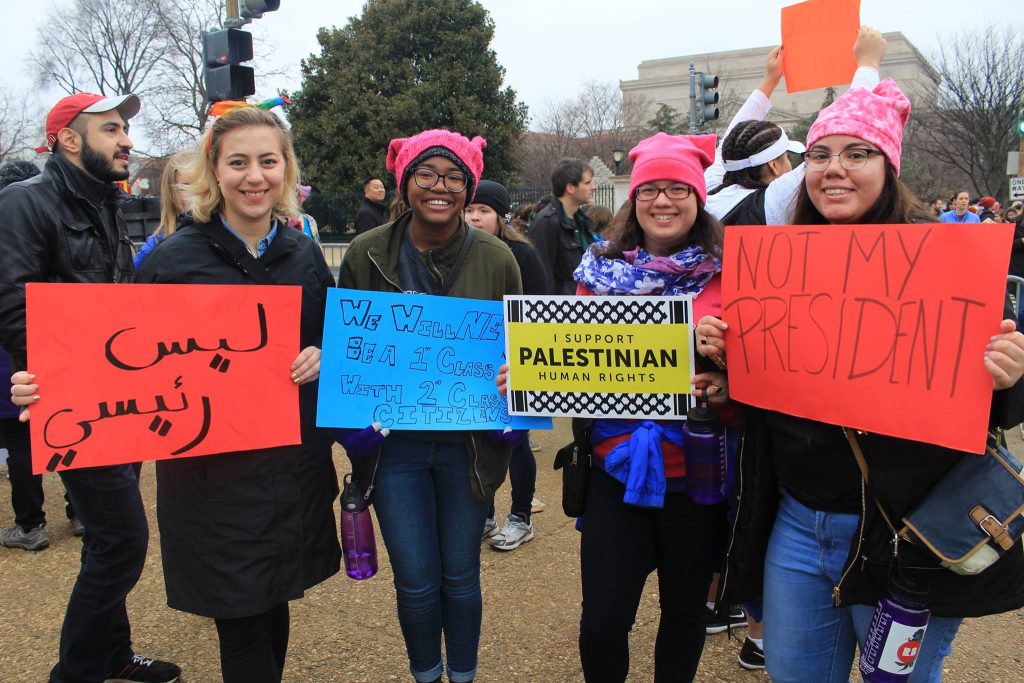
(Agnes Scott College students marching in Atlanta on 21 January 2017)
